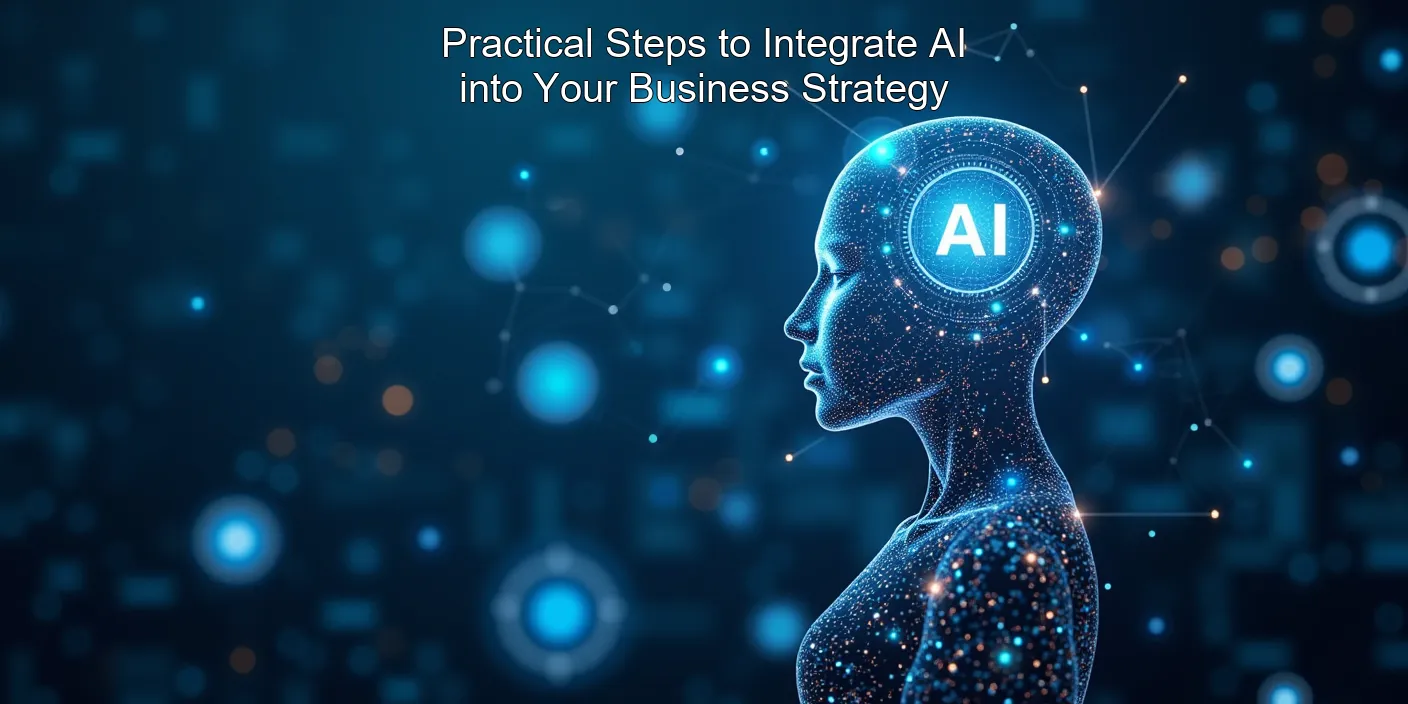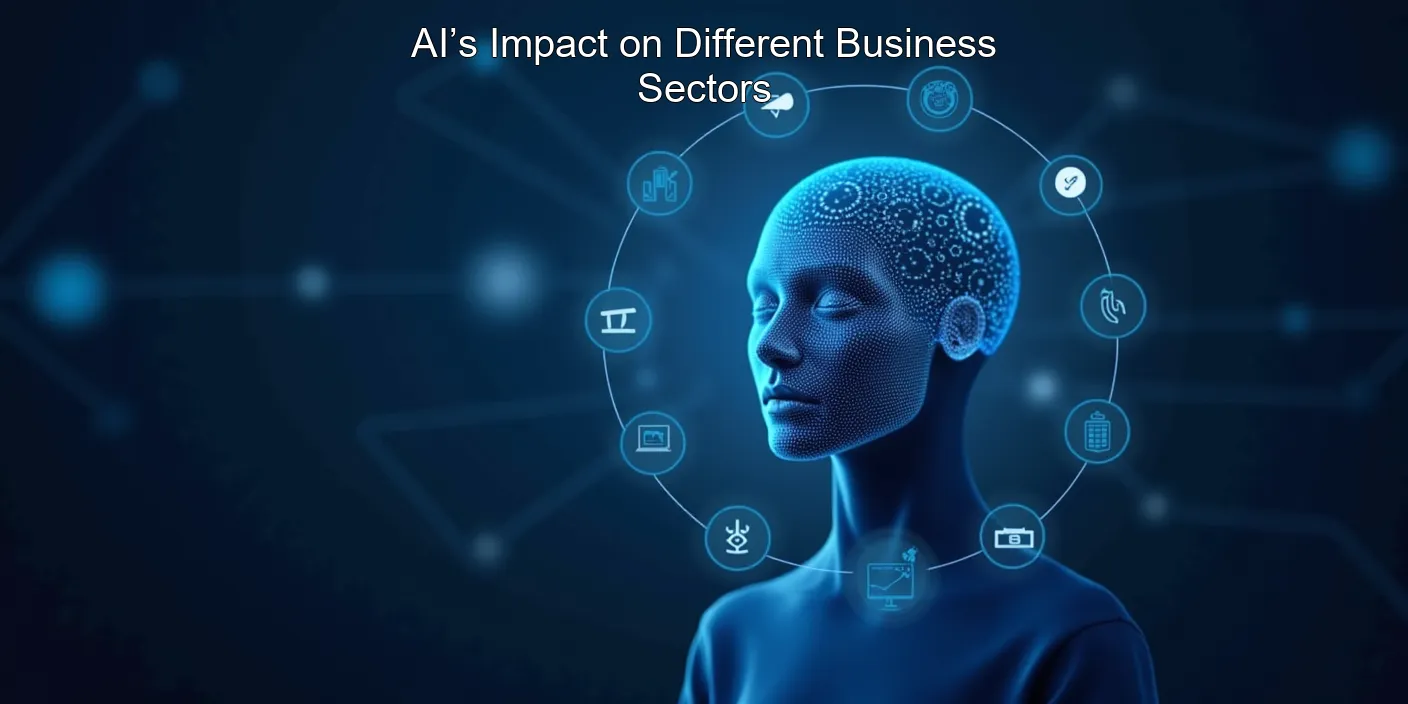The AI Revolution: Transforming Business Strategies and Operations
| Key Aspect | AI Impact |
|---|---|
| Decision Making | Enhanced data-driven insights |
| Efficiency | Automation of repetitive tasks |
| Customer Experience | Personalized interactions |
Artificial Intelligence (AI) is revolutionizing the business landscape, offering unprecedented opportunities for growth and innovation. Here’s how AI is reshaping various aspects of business:

#AI, #BusinessStrategy, #Innovation
- Streamlining operations through intelligent automation
- Enhancing customer experiences with personalized recommendations
- Improving decision-making processes with predictive analytics
- Optimizing supply chain management and logistics
“AI is not just a tool; it’s a transformative force that’s redefining how businesses operate and compete in the global marketplace.” – Sundar Pichai, CEO of Google
FAQ: AI in Business
Q: How is AI improving business efficiency?
A: AI automates routine tasks, analyzes vast amounts of data quickly, and provides insights for better decision-making, significantly boosting overall efficiency.
Q: Can small businesses benefit from AI?
A: Absolutely. AI tools are becoming more accessible, allowing small businesses to leverage chatbots, predictive analytics, and automation to compete with larger corporations.
Q: What are the ethical considerations of using AI in business?
A: Businesses must address data privacy, algorithmic bias, and transparency in AI decision-making to ensure ethical use of the technology.
5 Tips for Integrating AI into Your Business Strategy
- Start with a clear objective and use case for AI implementation
- Invest in data quality and infrastructure
- Upskill your workforce to work alongside AI
- Prioritize ethical considerations and transparency
- Continuously monitor and refine AI systems for optimal performance
According to a recent study by PwC, AI could contribute up to $15.7 trillion to the global economy by 2030, with $6.6 trillion coming from increased productivity and $9.1 trillion from consumption-side effects.
AI’s Role in Shaping Future Business Models

| Business Area | AI Application |
|---|---|
| Marketing | Hyper-personalization |
| Finance | Fraud detection |
| HR | Talent acquisition |
As AI continues to evolve, it’s paving the way for innovative business models and strategies. Companies are now exploring:
“AI: Revolutionizing Business Models and Strategies for the Future”
- AI-driven product development and innovation
- Predictive maintenance in manufacturing
- Autonomous operations in logistics and transportation
- AI-powered customer service and support
“The business models of the future will be built on the foundation of AI and machine learning, creating value in ways we can’t yet imagine.” – Andrew Ng, Co-founder of Coursera
FAQ: The Future of AI in Business
Q: How will AI impact job markets?
A: While AI may automate certain tasks, it’s also creating new job opportunities in AI development, data analysis, and human-AI collaboration.
Q: What industries will see the most significant AI disruption?
A: Healthcare, finance, retail, and manufacturing are expected to see major AI-driven transformations in the coming years.
Q: How can businesses prepare for an AI-driven future?
A: Businesses should focus on building a data-centric culture, investing in AI education, and developing agile strategies to adapt to rapid technological changes.
Steps to Future-Proof Your Business with AI
- Conduct an AI readiness assessment
- Develop a long-term AI strategy aligned with business goals
- Build partnerships with AI experts and technology providers
- Create a culture of continuous learning and innovation
- Stay informed about AI regulations and ethical guidelines
A report by Gartner predicts that by 2024, 75% of organizations will shift from piloting to operationalizing AI, driving a 5X increase in streaming data and analytics infrastructures.
As we navigate the AI revolution, businesses must adapt to stay competitive. By embracing AI technologies and integrating them into core strategies, companies can unlock new levels of efficiency, innovation, and growth. The future of business is undoubtedly intertwined with AI, and those who harness its power effectively will lead the way in shaping the global markets of tomorrow.
To stay ahead in this rapidly evolving landscape, businesses should also focus on fostering a culture of innovation & tech adoption. This involves not only implementing AI solutions but also developing strong leadership & strategy frameworks that can guide organizations through the complexities of AI integration.
For emerging companies, the AI revolution presents unique opportunities. Startup insights reveal that AI can level the playing field, allowing new entrants to disrupt established industries with innovative, data-driven solutions. As we move forward, the synergy between human creativity and artificial intelligence will undoubtedly shape the future of business in ways we’re only beginning to understand.
The Impact of AI on Business Strategy: Revolutionizing Operations and Decision-Making
Artificial Intelligence (AI) is rapidly transforming the business landscape, revolutionizing how companies operate and make strategic decisions. In this article, we’ll explore the profound impact of AI on business strategy and how it’s reshaping industries across the globe.
The AI Revolution in Business
| Key Aspects | Impact |
|---|---|
| Decision-making | Enhanced accuracy and speed |
| Operational efficiency | Increased automation and productivity |
| Customer experience | Personalized and improved interactions |
AI is transforming business strategies in numerous ways:
- Predictive analytics for informed decision-making
- Automation of repetitive tasks
- Personalized customer experiences
- Enhanced cybersecurity measures
“AI is not just a tool; it’s a strategic imperative for businesses looking to stay competitive in the digital age.” – Sundar Pichai, CEO of Google
According to a recent study by PwC, AI could contribute up to $15.7 trillion to the global economy by 2030.
FAQ: AI in Business Strategy
Q: How is AI improving decision-making in businesses?
A: AI analyzes vast amounts of data to provide insights, predict trends, and recommend optimal strategies, enabling more informed and faster decision-making.
Q: Can small businesses benefit from AI?
A: Absolutely. AI tools are becoming more accessible and affordable, allowing small businesses to improve efficiency, customer service, and market analysis.
Q: What are the potential risks of implementing AI in business strategy?
A: Risks include data privacy concerns, potential job displacement, and the need for significant investment in technology and training.
Practical Steps to Integrate AI into Your Business Strategy

- Assess your current business processes and identify areas where AI can add value
- Invest in AI education and training for your team
- Start with small-scale AI projects and gradually expand
- Partner with AI experts or consultants for guidance
- Continuously monitor and evaluate the impact of AI on your business
A survey by Gartner reveals that 37% of organizations have implemented AI in some form, with an additional 56% planning to do so in the near future.
“AI Adoption Surge: 93% of Businesses Embrace or Plan for Integration”
The Future of AI in Business Strategy
| Trend | Potential Impact |
|---|---|
| Ethical AI | Increased trust and transparency |
| AI-powered innovation | New products and services |
| Collaborative AI | Enhanced human-AI partnerships |
As AI continues to evolve, businesses must adapt their strategies to harness its full potential. Innovation & Tech will play a crucial role in shaping the future of AI-driven business strategies.
- Increased focus on ethical AI and responsible implementation
- AI-driven innovation leading to new products and services
- Greater emphasis on human-AI collaboration
- AI becoming a core component of business strategy across industries
“The businesses that will thrive in the coming decades are those that embrace AI not just as a tool, but as a fundamental part of their strategic vision.” – Andrew Ng, AI expert and entrepreneur
A report by McKinsey suggests that AI technologies could automate up to 30% of the hours worked globally by 2030, highlighting the need for businesses to adapt their strategies accordingly.
Q: How will AI impact job roles in the future?
A: While AI may automate certain tasks, it’s also expected to create new job roles focused on AI management, ethics, and human-AI collaboration.
Q: What industries are likely to see the biggest impact from AI?
A: Healthcare, finance, manufacturing, and retail are among the industries expected to see significant AI-driven transformations.
Q: How can businesses prepare for the AI-driven future?
A: Businesses should invest in AI education, foster a culture of innovation, and develop strategies that integrate AI as a core component.
As AI continues to reshape the business landscape, companies must adapt their strategies to remain competitive. By embracing AI technologies and fostering a culture of innovation, businesses can unlock new opportunities and drive growth in the AI-powered future. Leadership & Strategy will be crucial in navigating this transformative era.
For entrepreneurs looking to leverage AI in their ventures, Startup Insights can provide valuable guidance on integrating AI into your business model. Additionally, understanding the impact of AI on Global Markets is essential for businesses operating on an international scale.
The Impact of AI on Business Strategy: Revolutionizing Decision-Making
Understanding AI’s Role in Modern Business
| Key Aspects | Impact on Business Strategy |
|---|---|
| Data Analysis | Enhanced decision-making |
| Automation | Increased efficiency |
| Customer Experience | Personalized interactions |
Artificial Intelligence is reshaping the landscape of business strategy, offering unprecedented opportunities for growth and innovation. Let’s explore how AI is transforming various aspects of business:
- Predictive analytics for market trends
- Automated customer service solutions
- Optimization of supply chain management
- Personalized marketing campaigns
“AI is not just a tool; it’s a strategic partner in business decision-making.” – Sundar Pichai, CEO of Google
According to a recent study by McKinsey, AI could potentially deliver additional economic output of around $13 trillion by 2030, boosting global GDP by about 1.2 percent annually.
Q: How does AI improve decision-making in business?
A: AI analyzes vast amounts of data to provide insights, predict outcomes, and suggest optimal strategies.
Q: Can small businesses benefit from AI?
A: Absolutely. AI tools are becoming more accessible, allowing small businesses to enhance efficiency and competitiveness.
Q: What are the ethical considerations of using AI in business?
A: Businesses must address data privacy, algorithmic bias, and transparency in AI-driven decisions.
- Identify specific business problems AI can solve
- Invest in data infrastructure and quality
- Upskill your workforce in AI literacy
- Start with pilot projects to demonstrate value
- Develop an AI ethics framework
A survey by PwC reveals that 72% of business decision-makers believe AI will be fundamental in the future, with 86% saying AI is becoming a “mainstream technology” at their company in 2021.
AI’s Impact on Different Business Sectors

| Sector | AI Application |
|---|---|
| Finance | Fraud detection, algorithmic trading |
| Healthcare | Diagnostic assistance, drug discovery |
| Retail | Inventory management, personalized recommendations |
The integration of AI across various sectors is revolutionizing traditional business models. Here’s how different industries are leveraging AI:
Key Insights
- Manufacturing: Predictive maintenance and quality control
- Marketing: Hyper-personalization and customer segmentation
- Human Resources: Talent acquisition and employee engagement
- Logistics: Route optimization and demand forecasting
“The business plans of the next 10,000 startups are easy to forecast: Take X and add AI.” – Kevin Kelly, Founding Executive Editor of Wired magazine
A report by Gartner predicts that by 2024, 75% of organizations will shift from piloting to operationalizing AI, driving a 5X increase in streaming data and analytics infrastructures.
FAQ: AI Implementation Challenges
Q: What are the main challenges in implementing AI in business?
A: Common challenges include data quality issues, lack of AI expertise, and integration with existing systems.
Q: How can businesses overcome resistance to AI adoption?
A: Education, transparent communication, and demonstrating tangible benefits are key to overcoming resistance.
Q: What role does leadership play in AI adoption?
A: Leadership is crucial in setting the vision, allocating resources, and fostering a culture of innovation and continuous learning.
Best Practices for AI-Driven Business Strategy
- Align AI initiatives with overall business objectives
- Prioritize data governance and security
- Foster collaboration between AI experts and domain specialists
- Continuously monitor and evaluate AI performance
- Stay informed about AI regulations and compliance requirements
According to an IBM study, 35% of companies reported using AI in their business in 2022, and an additional 42% reported they were exploring AI. This marks a significant increase from 2021, where just 20% of companies were using AI.

As we navigate the AI-driven future of business, it’s crucial to stay informed about the latest Innovation & Tech trends. For insights on how AI is reshaping Global Markets, explore our comprehensive analysis. Leaders looking to harness AI’s potential should check our Leadership & Strategy section. For entrepreneurs, our Startup Insights offer valuable perspectives on leveraging AI for new ventures.



